Turning Old Tyres Into Urban Art
- By Sharad Matade & Gaurav Nandi
- August 21, 2025

In a country grappling with mountains of waste and a pressing need for sustainable solutions, one designer in Kanpur is quietly rewriting the rules of urban innovation. Vaishali Biyani, a former recruiter-turned-upcycler, has built a company that transforms discarded truck tyres into striking urban furniture, art installations and public park infrastructure. Her start-up, De’Dzines, operates at the unlikely intersection of circular economy, rural employment and high-concept design. In spaces as diverse as five-star hotels and snowy army outposts, her creations endure and inspire. What began as a curiosity about tyre waste has grown into a bold, scalable vision for environmental reinvention.
In the snow-clad silence of Siachen, India’s highest military outpost, stands a curious piece of furniture made not of wood, nor of steel but from discarded tyres. Two years since it was installed, the chair hasn’t warped, cracked or budged. Even in snowstorms, the furniture is standing strong. It was one of many quiet validations for a project that, to many, still sounds improbable: transforming end-of-life tyres into swings, sculpture parks and stylish indoor planters.
On the dusty fringes of Kanpur, a former industrial powerhouse now known more for its mountains of discarded waste than for its textiles, an unexpected kind of manufacturing is quietly reshaping public parks and luxury hotels. The raw material? Old truck tyres.
At the heart of this transformation is an unlikely entrepreneur. Once immersed in the startup buzz of Delhi, she spent over a decade building a successful recruitment company. But a twist of fate took her to Kanpur, where she spotted something that others had learned to ignore: waste.
“Waste was everywhere, from roads, outside factories to back alleys. But tyres stood out. They were built to last and nobody knew what to do with them,” said Vaishali Biyani, Founder of De’Dzines.

Her shift from the digital corridors of Delhi to the tyre-strewn lanes of Kanpur was anything but planned. “I had no intention of starting over. My recruitment firm was doing well. But when I relocated in 2017, I began noticing the sheer scale of unutilised waste, especially tyres,” she admitted.
What followed was a period of grassroots immersion. By day, she continued recruitment work. By night, she sat with tyre scrap dealers, learning the material inside out. She recalls walking through filthy lanes where tyres lay in heaps, asking questions most dealers never expected.
In 2019, she registered her company De’Dzines and formally launched commercial operations in 2021. Her goal was to upcycle truck tyres into handmade furniture, planters and urban sculptures.
The choice of truck tyres was deliberate as they comprise better rubber composition, more wire and stronger polymers.
The early days weren’t easy. Setting up in Kanpur came with its own cultural and logistical hurdles. “People here had never heard of upcycling.
They thought I was collecting garbage, and when I tried to hire people, nobody wanted to work with tyres. Even explaining the concept was a battle,” recalled Biyani.
Her 20,000-square-foot workshop in Kanpur became ground zero for a new type of production rooted in low-tech and high-ingenuity processes. “We use small tools, not big machines. Everything is handmade, from cutting, cleaning to polishing. Each product is crafted by a team of 15 full-time workers, all from nearby villages. For larger orders, the team expands to 50,” explained Biyani.
She recalled that hiring was a nightmare. Hence, she trained locals, most of whom had never worked in manufacturing. Today, they handle everything from wire removal to final finishing.
CHANGING PERCEPTIONS
The idea didn’t start in a studio but in scrap yards and municipal back alleys, where tyres lay heaped, burnt, buried and forgotten. Starting with a handful of used tyres, the founder and his lean team began crafting swings and planters by hand. Today, the company consumes between 10–12 tonnes of tyres monthly, rising significantly during major government projects.
“We usually do two big waste to wonder parks each year. If it’s a two-acre project, it could require tonnes of tyres. We’ve done parks where the government provided tyres themselves; we just deducted that cost from the tender,” said Biyani.
She added that in these early partnerships, the team didn’t have the luxury of choosing tyre types. But now, they get to select what is needed. The company now focuses on nylon-based truck tyres, especially from buses and transport bodies.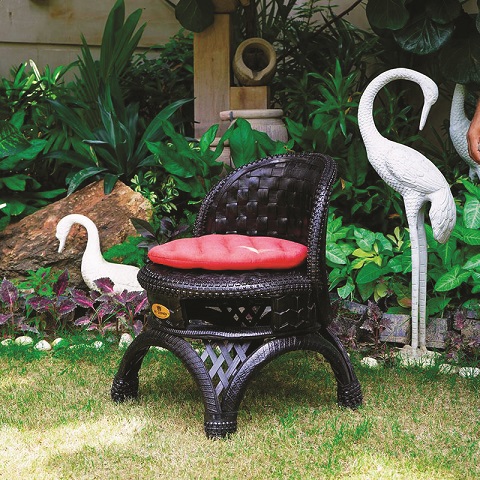
Changing consumer perception was perhaps the biggest challenge as tyres are dirty and smelly. People don’t even want to touch them. So she launched a direct-to-consumer (D2C) model to test market acceptance. The Covid-19 lockdowns, surprisingly, helped.
“Everyone moved online. I started listing products on Amazon before I even had a website. The response was overwhelming. People liked what they saw and left great reviews. That gave us confidence to double down,” averred Biyani.
But sustainability messaging wasn’t the silver bullet as Indians don’t pay extra for eco-friendly, she contended. The company had to position the products for its durability, aesthetics and value.
She recalls the initial scepticism from customers divulging, “We had people asking that won’t this smell or will it leave black marks. So we added multiple layers of polish, built a hygiene protocol and offered an easy return policy. If you didn’t like the product, you could send it back. No questions asked,” she explained.
The strategy worked. The brand slowly built a reputation not just for environmental responsibility but also for reliability and craftsmanship.
UPCYCLED PRODUCT
At De’Dzines, each tyre begins its second life with a rigorous cleaning process. Steel wires are removed, often manually. Then comes cutting, which is a precision job to ensure the structural integrity of the product. After shaping, the rubber is treated with safe, non-toxic polish and reinforced with recycled wood or steel depending on the final design.
“The design philosophy is simple. Form follows function but beauty matters. We don’t want the product to scream ‘I’m made of waste’. We want it to feel like something you’d be proud to place in your home or office,” she explained.
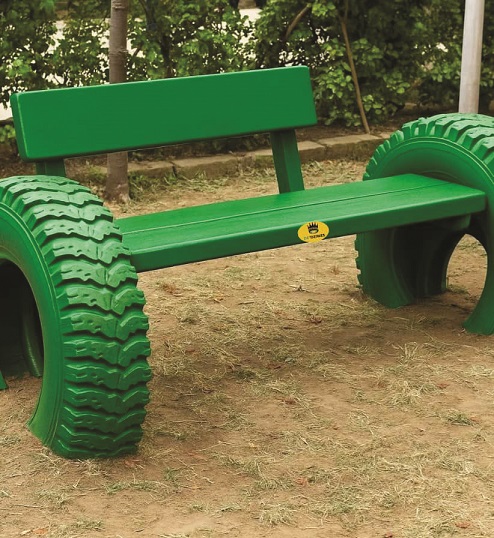 Some products take two days to complete. Others, like swing seats or large benches, can take over a week. The company isn’t chasing mass production but chasing quality, story and purpose.
Some products take two days to complete. Others, like swing seats or large benches, can take over a week. The company isn’t chasing mass production but chasing quality, story and purpose.
While European and Australian companies offered to export tyre scrap to her for free, she refused. “The logistics defeat the purpose. Sustainability isn’t just about materials; it’s also about carbon footprint. Why ship tyres across oceans when Uttar Pradesh is full of them,” said Biyani.
She signed MOUs with municipal corporations across Agra, Lucknow, Prayagraj and Gorakhpur. These urban bodies provided used tyres from fleet vehicles.
While scrap tyres are generally expensive in India, this circular sourcing model keeps costs manageable. “The tyre scrap market in India is fragmented, expensive and full of middlemen. That’s why we prefer working directly with municipal bodies,” noted Biyani.
For projects with unpredictable demand, she still sources from the open scrap market.
BACKYARDS TO FIVE-STAR LOBBIES
As public confidence grew, so did the scale of projects. De’Dzines moved from retail to B2B, then to government partnerships. One milestone was supplying planters to the Shangri-La Eros Hotel in Delhi. “The hotel placed them in every room and throughout the gardens. That proved we could pitch to luxury hospitality,” said Biyani.
Today, De’Dzines has designed and completed over 10 public parks in partnership with local governments. It handles everything from concept to installation. It’s no longer just about products but transforming spaces.
In one project near Prayagraj, she repurposed over 4,000 tyres to create an entire play zone that included benches, see-saws, tyre walls and garden edges. “We turned waste into wonder. The joy on children’s faces is our biggest endorsement,” quipped Biyani.
For a country drowning in waste yet starved for sustainable innovation, De’Dzines offers a blueprint that blends environmental purpose with rural employment and scalable design. Her journey is also a quiet rebuke to the idea that innovation only happens in technological hubs.
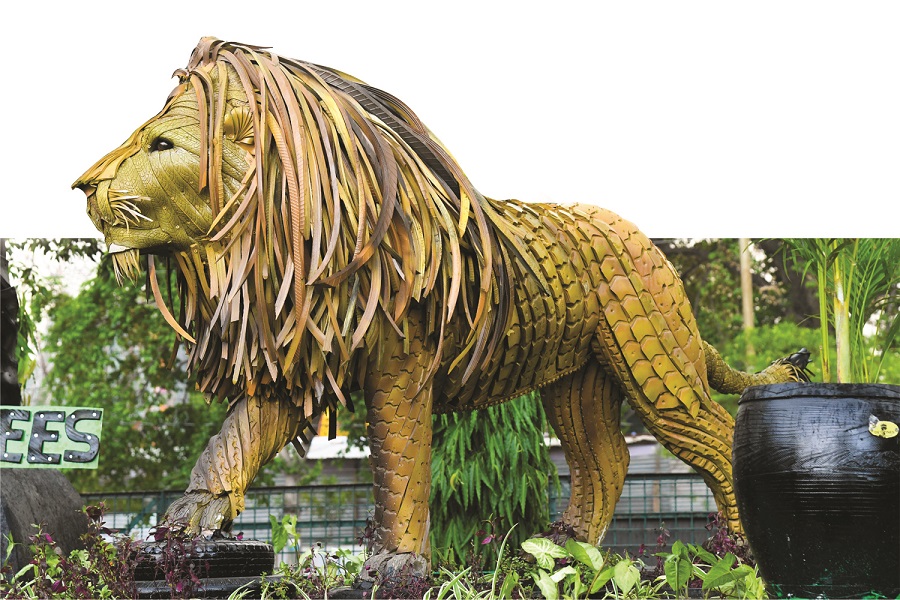 “I didn’t come here to start a recycling revolution. I was just curious about where tyres go when they die. That one question changed everything,” she contended.
“I didn’t come here to start a recycling revolution. I was just curious about where tyres go when they die. That one question changed everything,” she contended.
As she trains her team for their next urban park project, surrounded by stacks of discarded rubber, the message is clear that even the dirtiest waste can have a second life with beauty and durability.
HANDMADE, YET SCALABLE
One might imagine such a business struggling with scale. After all, each piece, be it a sculpture or a chair, is largely handmade. But ingenuity, it turns out, is as core to the company’s identity as sustainability.
A telling moment came during an export order. A client requested 500 customised planters with a 20-day delivery timeline. “It wasn’t our design. It was theirs and very detailed. So we built a single mould for it, trained 50 people and finished in 15 days instead of 20,” recalled a confident Biyani.
This success paved the way for future scale-ups. The team has since developed moulds for several recurring products while still retaining flexibility for custom projects.
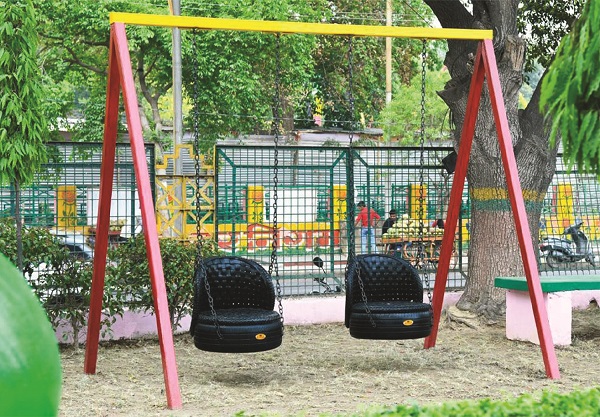
“We now know how to train fast, hire locally and deliver in volume. It’s a hybrid of craft and light manufacturing,” she added.
Alluding to working with different government bodies, Biyani spoke candidly about the public sectors’ promise and bureaucracy. “Municipal corporations are straightforward. We sign a simple MOU that lets us collect tyres for two or five years. In return, we give them a rate list for furniture or sculptures when needed. It’s simple and direct,” she contended.
Working with state transport undertakings like BEST or DTC, however, is a different story as their procurement is through massive tenders.
So, for now, she prefers to work with cities like Prayagraj, where the team completed nine junction designs and two parks in just 45 days.
LOOKING AHEAD
Much of the company’s growth has come not from sales teams but from serendipity and design.
One of the most fruitful connections came via social media, when a CSR head from Bridgestone discovered the team’s Instagram posts. Today, the company is working with Bridgestone on a multi-year sculptural design project in Pune.
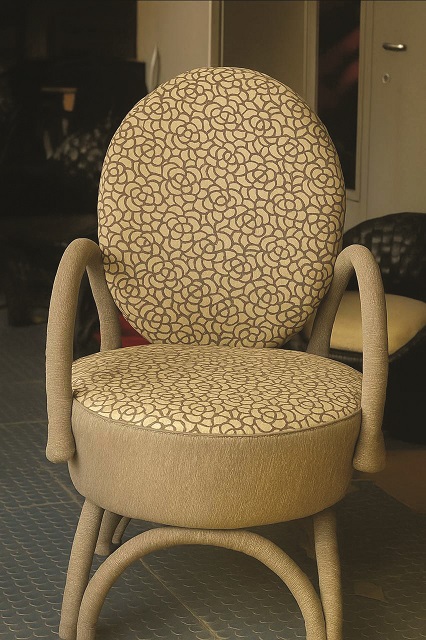 Her vision now extends beyond upcycling. “We’re exploring modular designs that can be assembled onsite for large-scale installations,” she revealed. There are also plans to set up satellite workshops in other parts of UP using the same village employment model.
Her vision now extends beyond upcycling. “We’re exploring modular designs that can be assembled onsite for large-scale installations,” she revealed. There are also plans to set up satellite workshops in other parts of UP using the same village employment model.
Eventually, she wants to export as she believes that the products should sit in parks in Dubai or public plazas in Europe. Not because they’re Indian or upcycled but because they’re beautiful and built to last.
As demand grows, the company is moving into newer segments. The next frontier is hospitality.
“We’re now working with luxury hotels, resorts and even army cantonments. Our products survive storms in Siachen. They survive monsoons in Goa. That’s our pitch: sustainable, durable and different,” quipped a cheerful Biyani.
She’s also gearing up for a major hospitality exhibition in Greater Noida from 3–6 August, where the team will launch a new line of indoor furniture made from upcycled tyres.
But challenges remain; chief among them is pricing. “A virgin plastic chair is cheaper than our tyre-based one. Convincing someone to pay a premium for sustainability is our biggest hurdle,” she contended.
There is a poetic irony in transforming black industrial waste into playful swings and public sculptures. It is perhaps this unlikely fusion of function and imagination that distinguishes the designer.
In places like Prayagraj, Pune and even Siachen, tyres are no longer confined to roads; they are finding new meaning as symbols of transformation.
For a small design company with ambitious ideas, it seemed that the path forward might indeed be paved, quite literally, with rubber.
CHIMEI Earns Second Consecutive CDP A Rating For Actions Against Climate Change
- By TT News
- February 02, 2026

Taiwan-based performance materials company CHIMEI has secured a distinguished A rating in the CDP Climate Change assessment for the second consecutive year, positioning it within the leading four percent of global organisations evaluated in 2025. This recognition from the prominent environmental disclosure platform underscores the company’s sustained excellence across critical areas such as climate governance, comprehensive risk management and transparent emissions reporting. CHIMEI’s performance demonstrates tangible progress in lowering product emissions intensity, driving self-managed reduction projects and rigorously measuring greenhouse gas outputs in accordance with international standards.
Central to the company’s strategy is its ‘Clean & Green’ vision, which directs a thorough low-carbon transformation. This commitment is operationalised through internal carbon pricing, optimised manufacturing processes and a shift towards renewable energy. CHIMEI further ensures accountability by obtaining third-party verification for the carbon footprints of its entire product range. The pursuit of sustainability extends beyond its own facilities, as the company actively promotes the use of sustainable materials and fosters collaborative decarbonisation efforts throughout its value chain.
Looking forward, CHIMEI is dedicated to engaging with customers, suppliers and partners to advance shared climate objectives, including its ambitious 2050 net-zero target. By continuously investing in innovative technologies and eco-friendly solutions, CHIMEI aims to be a catalyst for industry-wide change, supporting the transition toward a more resilient and low-carbon future for all.
- Kraton
- Speciality Polymers
- ISCC Plus Certification
- International Sustainability and Carbon Certification
Kraton Achieves ISCC PLUS Certification For Panama City Facility
- By TT News
- January 30, 2026

Kraton Corporation, a leading global producer of speciality polymers and high-value bio-based chemicals derived from pine wood pulping co-products, has achieved International Sustainability and Carbon Certification (ISCC) PLUS for its manufacturing facility in Panama City, Florida, United States. This independent certification tracks sustainable materials via a mass balance approach. The achievement allows Kraton to issue a formal ISCC PLUS Sustainability Declaration with shipments of its biobased polyterpene resins, providing its customers with the documentation needed to validate the renewable content in their own products.
The Panama City site becomes the company’s fourth production plant to gain this certification, building upon a commitment that started with the certification of its Sandarne, Sweden, facility in 2021. By securing these certifications across its network, Kraton strengthens its leadership in supplying circular and renewable solutions. This effort supports broader industry shifts, as customers can now more seamlessly integrate verified, sustainable materials into their supply chains and end products.
Ultimately, the company’s pursuit of such certifications aligns with a larger transition towards a more sustainable and circular economy, demonstrating how specialised chemical producers can enable tangible environmental progress through verified chain-of-custody systems.
Lana Culbert, Kraton Pine Chemicals VP of Marketing, said, “Our SYLVARES™ and SYLVATRAXX™ brands feature a portfolio of high-performance polyterpene resins. They are widely recognised for their use in adhesives and tyre applications, yet their versatility extends to other industries, like agriculture, with more opportunities ahead. While we can measure bio-based content of our pine chemicals using Carbon-14 analysis, certifying our Panama City facility under ISCC PLUS strengthens supply chain transparency, supporting the growth of the circular economy.”
Solvay Opens Europe’s First Bio-Circular Silica Facility In Italy
- By TT News
- January 30, 2026

Solvay has inaugurated its new bio-circular silica facility at its plant in Livorno, Italy, a strategic investment that underscores Italy’s industrial leadership in green innovation. The facility directly anticipates evolving EU sustainability rules for tyres and supports the ambitious environmental goals of Solvay’s customers. By establishing this operation, Solvay positions itself as a proactive partner in achieving the objectives of the European Green Deal and upcoming product regulations.
The site manufactures highly dispersible silica using an innovative process that transforms rice husk ash, an agricultural byproduct, into a valuable bio-based raw material. This method creates a local circular economy, benefits the agricultural sector, and reduces associated CO₂ emissions by 35 percent compared to conventional production.
This initiative is a cornerstone of Solvay's global strategy to transition all its silica production to certified circular raw materials by 2026. While the Livorno site is the first to use rice husk ash, other global plants will utilise different local waste streams. For the tyre industry, adopting this circular silica already enables tyres to contain up to 15 percent recycled or renewable content, providing significant progress towards the sector’s 2030 material targets.
Beyond compliance, the silica produced is essential for developing energy-efficient tyres that lower rolling resistance, thereby reducing fuel consumption and extending electric vehicle range. The Livorno facility thus reinforces Solvay's market leadership in sustainable silica and highlights Italy’s vital role in the company’s broader portfolio of green investments, including projects in green hydrogen and circular soda ash.
Philippe Kehren, CEO, Solvay, said, “By acting now, Solvay is helping tyre manufacturers prepare for future EU requirements and meet their own sustainability goals. Livorno is a tangible example of how we turn circular economy principles into industrial reality, enabling progress for generations.”
Jana Striezel, Head of Purchasing at Continental Tyres, said, "Solvay has managed to transform an agricultural byproduct into a high-performance material on an industrial scale. We are looking forward to integrating more and more rice husk ash silica as a recycled material in our tyre production and are very satisfied with its performance. We are keen on innovative, renewable and recycled materials because they support our ambitious sustainability roadmap.”
An Nuyttens, President of Solvay’s Silica business, said, “Livorno sets a benchmark for circular innovation in Europe and beyond. Our goal is clear: wherever Solvay produces silica, we will integrate circular materials to reduce environmental impact and support our customers’ sustainability objectives.”
Ecolomondo Achieves Record Tyre Recycling Milestone
- By TT News
- January 30, 2026

Ecolomondo Corporation, a Canadian developer of sustainable technology for recycling scrap tyres, has announced that its Hawkesbury facility reached a key operational milestone during the week of 12 January 2026, by successfully completing a record five double processing batches. This progress signifies a major step forward as the company advances towards full commercial production at the plant. Utilising its proprietary Thermal Decomposition Process (TDP) and a new automated Human-Machine Interface system, the facility maintained consistent operations and produced high-quality recovered materials.
The week’s activity led to the recycling of an estimated 9,375 scrap tyres, processing a total of 150,000 pounds (approximately 68,038 kg) of rubber feedstock. From this, approximately 60,000 pounds (approximately 27,215 kg) of recovered carbon black and 75,000 pounds (approximately 34,019 kg) of tyre-derived oil were generated, alongside syngas used to power the process itself.
As a Canadian leader in tyre recycling technology, Ecolomondo views these results as a strong validation of the scalability and reliability of its proprietary TDP system, underscoring the ongoing ramp-up at its Hawkesbury TDP facility. This consistent performance enhances the company's position in the circular economy, turning a challenging waste stream into valuable industrial commodities and demonstrating the commercial viability of its innovative approach.







Comments (0)
ADD COMMENT